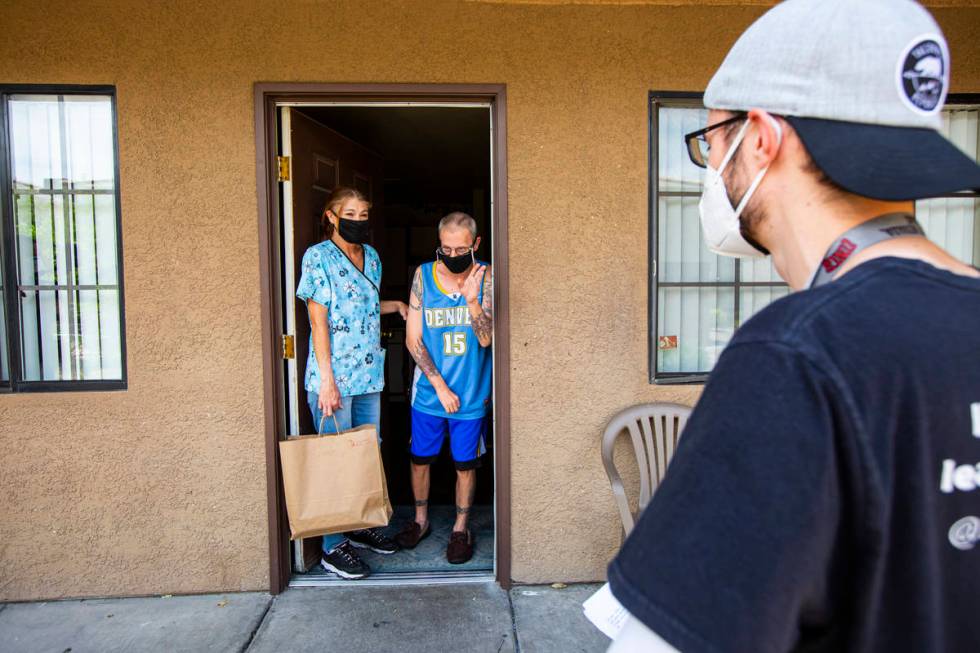Partnerships key to getting food to hungry without long lines

Jon Thompson rarely gets a good look at the people he’s helping to feed, and almost never gets to speak with them.
“It kind of sucks that the way we have to deliver is, you kind of just drop it, knock on the door, and walk away,” the UNLV pre-med student said of the five to 12 stops he makes per day, three to five days a week. “But that’s the way it has to be because of the coronavirus.”
The people Thompson serves through the Delivering with Dignity food program are at particular risk from COVID-19 because of underlying health risks. As a result, his deliveries of donated meals from popular local restaurants are strictly no-contact.
On this day, however, he got the chance to hear a few of their stories thanks to three recipients who agreed to speak to the Review-Journal about the program — from a distance, with masks, without allowing anyone into their homes.
Patrick Bunts, whose age and underlying medical conditions have left him “very afraid to go out into public,” cheerfully offered cold beverages on a hot summer afternoon as he sang the praises of the food from Valencian Gold he has received through the program and shared his thoughts on classic punk rock.
DJ Rindt wasn’t able to speak more than a word or two but insisted on coming to the door to wave to Thompson in thanks.
Aiden Pina, 9, who came to the door dressed in pajamas, said lasagna was his favorite meal so far from Delivering with Dignity. When asked about the last places he remembered visiting before COVID-19 struck, he rattled off a string of hospitals, medical facilities and doctors’ offices where he has been treated for the cancer he is battling.
Each was referred to the program through a different agency. Each has a different story.
“It’s been a great opportunity to actually hear what their life is, their story and the reasons why we’re delivering to them,” Thompson said as he completed his deliveries for the day.
Understanding those stories, and being able to address them, has created a fundamental shift in how Las Vegas tackles a food insecurity problem that has skyrocketed since the start of the COVID-19 crisis.
“Our nonprofit organizations have trusting relationships with our most vulnerable people,” said Delivering with Dignity’s Punam Mathur, explaining why her group has teamed with organizations as diverse as Aid for AIDS of Nevada, Susan G. Komen and Teach for America to reach people who would benefit from the program.
“The trust in that relationship matters a lot. And for our most vulnerable person or family, they are managing layer upon layer of complexity, including a deadly virus, and they need to be connected to someone that they trust, who can help them problem-solve all myriad manner of needs.”
That cooperative approach is also what the Three Square food bank credits with shrinking the lines at its drive-thru pantries, which, in April, stretched for miles.
Larry Scott, Three Square’s chief operating officer, said the “modest decline in demand at the drive-thru sites” over the past several months can be attributed to his organization reconnecting with many independent agency partners that temporarily had suspended operations to protect volunteers from the coronavirus.
“We’d gone from 180 down to 10 agency partners that we were distributing food to, and now we’re back up to approximately a hundred that are providing food,” Scott said.
“It’s really important to go back to that model,” Scott said. “Because in a drive-thru, it’s food, but it’s impersonal. And so the person who wants to know about where they can fill out an application for SNAP — for food stamps — or where they can get some mental health direction, or (help with) substance abuse issues, they don’t really have that shoulder to lean on at a drive-thru.”
For Chefs4Vegas, which grew out of a group of local chefs meeting in a dirt lot to discuss how they could help feed neighbors struggling during the pandemic, finding similar local partners has allowed them to distribute 1,500 boxes of produce per week locally. When they read on social media that veterans were eating dog food in a rural Nevada town, they responded by filling a 53-foot refrigerated truck with food and driving it to the town’s community center.
The group’s president, Jonathan Batista, said working with existing organizations, but remaining independent, has allowed it to meet the growing need while cutting through some red tape.
“With (some of) the bigger organizations, they ask you to prove your poverty,” said Batista, who has been on the receiving end of food aid and remains sensitive to the indignities that can come with that situation. “It’s like, are you homeless? Prove that. Do you have a job? Prove that. How many kids do you have? Prove that.
“We have no registration, no problems.”
While innovative models have helped reduce lines, Batista stressed that now is not the time to get complacent.
“The lines have changed, but the need has not,” he insisted.
Scott agreed, estimating that over 20 percent of our community remains food insecure, up from around 12 percent before this crisis. In May, Three Square distributed 5.4 million pounds of food, up from 4.2 million pounds in May 2019.
“The way I would best describe it is, (before COVID-19) we were running this marathon. We were doing well. We were actually out ahead a little bit. And then all of a sudden we had to turn it into a dead sprint,” he said. “But now it’s more of an Ironman. It’s more of a triathlon. Because it’s just so much bigger right now, and it is not remotely resolved.”
Contact Al Mancini at amancini @reviewjournal.com. Follow @AlManciniVegas on Twitter and Instagram.